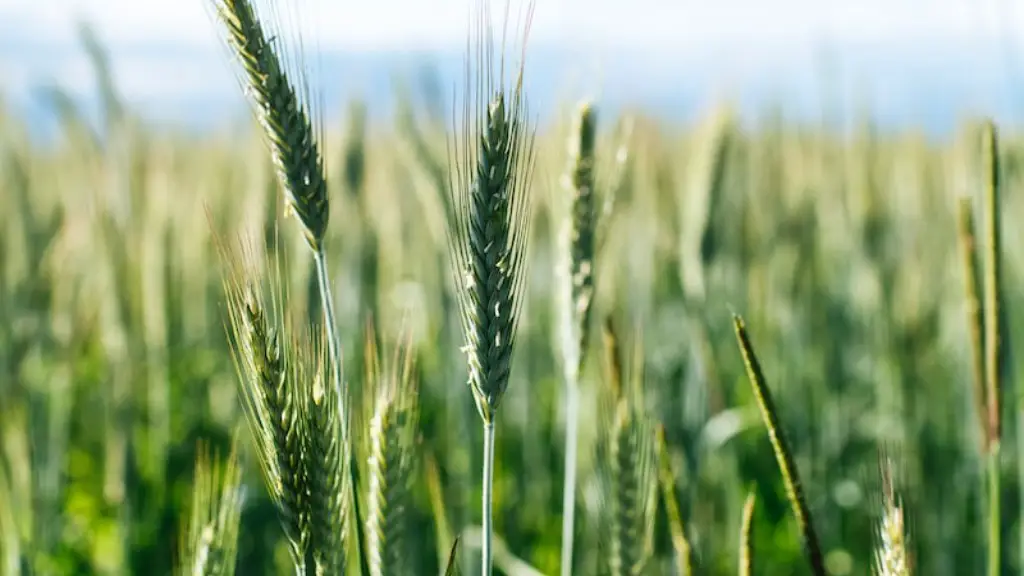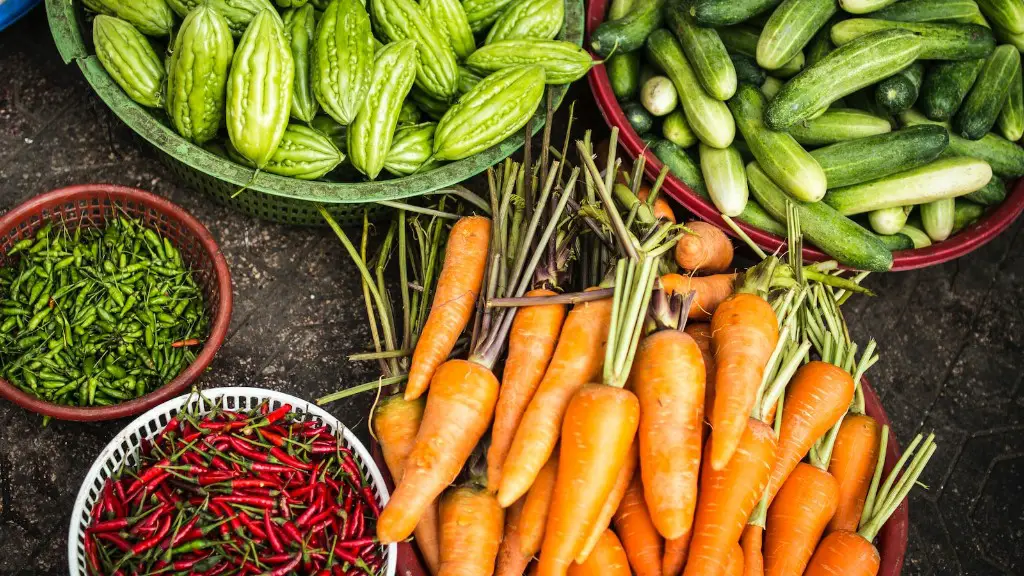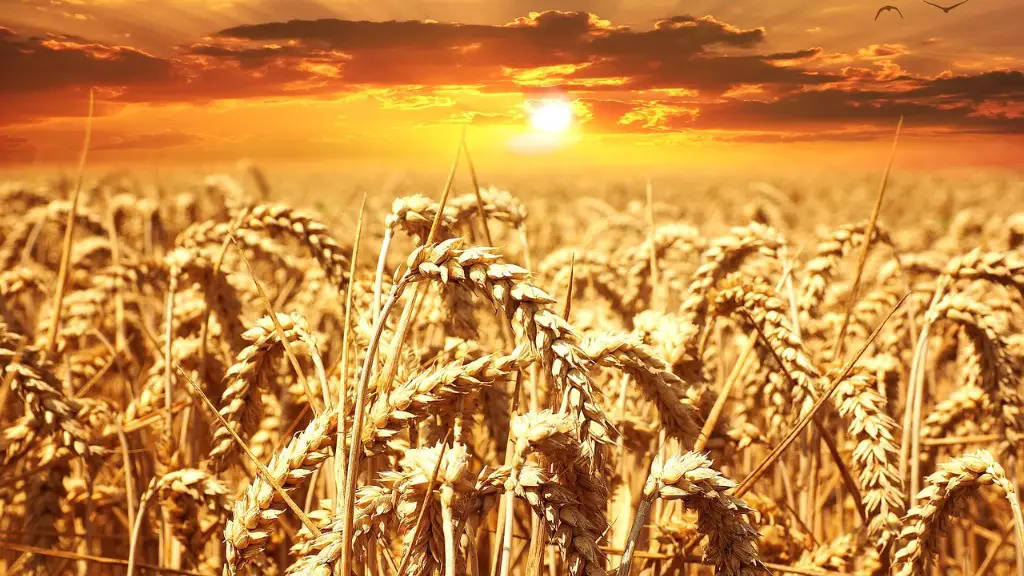Agriculture provides us with many essential goods and services. It is responsible for producing food and feed commodities that are essential for sustaining human life, and it also helps in the production of many other resources, such as clothing, shelter, medicines, and fuel. Agriculture also serves as the basis for a large number of industries and services, and provides employment for a significant portion of the global population. Through advances in technology and agricultural production techniques, agricultural production has increased significantly over the years, and continues to do so.
Agricultural production is one of the most important components of any economy. It provides food, feed and other raw materials that are needed to provide necessary goods and services. It also has a direct impact on the overall economic stability of a country, as it stimulates other areas of production and trade through the acquisition of necessary materials and supplies. In addition, agricultural production can improve the economy by providing employment opportunities, improving the quality of life of people in rural areas, and contributing to national and local tax revenues.
Agriculture also has a direct impact on the environment. Through increased production and improved management practices, agricultural production can help manage water resources, reduce soil erosion, improve air quality, and increase biodiversity. Agricultural production can also help to prevent or minimize the impacts of climate change, by reducing the amount of carbon dioxide released into the atmosphere.
Agricultural production also has a direct effect on the livelihoods of people in rural areas. Through increased incomes, rural households have access to better education and health care facilities, improved nutrition, and improved access to financial services. Rural households can also benefit from increased access to energy, including renewable energy sources.
Finally, agriculture can help to boost global economic growth and prosperity. By providing abundant quantities of food, feed and other raw materials at competitive prices, agricultural production can stimulate trade and investment flows, leading to increased levels of economic activity and improved economic welfare of people in developing countries.
Impact of Agriculture on Food Security
The primary benefit of agricultural production is its ability to provide food and feed commodities that are necessary for sustaining human life. Through improved production and management techniques, global food security has been greatly improved in recent decades. Through improved technology for agricultural production and better access to markets, farmers in developing countries have been able to increase their yields, resulting in increased incomes and improved nutrition for their families. Improved agricultural production also helps to reduce poverty by improving the purchasing power of rural households.
In addition to providing food and feed, increased agricultural production also increases the availability of other important commodities, such as clothing, shelter, medicines, and fuel. Improved agricultural production reduces rural poverty by providing employment opportunities and improving the quality of life of rural households. Agricultural production can also stimulate trade and investment flows, leading to increased levels of economic activity and improved economic welfare of people in developing countries.
Improved agricultural production and management also has a direct impact on environmental protection. Through increased production and improved management practices, agricultural production can help manage water resources, reduce soil erosion, improve air quality, and increase biodiversity. This can help mitigate the effects of climate change, as well as reducing the release of harmful pollutants into the environment.
Finally, agricultural production can improve public health by reducing food insecurity, reducing malnutrition and the incidence of some food-borne diseases. Improved diets, resulting from increased agricultural production, can help to reduce the prevalence of non-communicable diseases, such as obesity and diabetes.
Impact of Agriculture on Rural Livelihoods and Poverty Alleviation
Agricultural production also has a direct impact on the livelihoods of rural households. Through increased incomes, rural households have access to better education and health care facilities, improved nutrition, and improved access to financial services. Increased agricultural production can also provide employment opportunities, which can help to reduce rural poverty by providing additional incomes to households and helping to improve the quality of life of people in rural areas.
In addition, increased agricultural production also helps to support local economies, as increased production leads to increased investments in local infrastructure. These investments can create new jobs and help to stimulate the growth of small and medium-sized enterprises, which often have a positive impact on the local economy.
Finally, increased agricultural production can help to reduce the reliance of countries on imports, by reducing the cost of imported food and other raw materials. By increasing domestic production, countries are able to reduce the need for imports, reducing their exposure to fluctuations in global commodity prices and exchange rates, and providing a more stable source of income.
Impact of Agriculture on the Natural Environment
Agricultural production has a direct and indirect effect on the natural environment. Through improved production and management techniques, agricultural production can contribute to the conservation of natural resources and the improved management of water resources. Improved water management practices can reduce soil erosion, improve air quality, and protect water quality.
Increased agricultural production can also help to reduce the impact of climate change. Agricultural production can help reduce the release of carbon dioxide into the atmosphere by capturing and storing carbon in agricultural soils. By reducing the amount of carbon dioxide released, agricultural production can reduce the severity of global climate change and the associated impacts.
Agricultural production can also help to improve biodiversity, by reducing the need for agricultural chemicals. Reduced use of agricultural chemicals can help to protect the health of wildlife and reduce the spread of toxic chemicals into the environment. In addition, improved production techniques can also contribute to sustainable land management practices, which help to protect natural resources and conserve biodiversity.
Finally, agricultural production can help to protect and restore degraded landscapes. Through increased agricultural production and improved management practices, degraded landscapes can be restored, improving the quality of life of people in rural areas and providing new sources of income.
Impact of Agriculture on Economic Development and Global Trade
Agricultural production is also essential for economic development. Through increased production and improved management techniques, agricultural production has been responsible for reducing poverty and increasing incomes in many countries. Increased agricultural production has also helped to stimulate trade and investment flows globally, as countries are able to provide abundant quantities of food and other agricultural commodities at competitive prices.
Increased agricultural production can also help to reduce the reliance of countries on imports, by reducing the cost of imported food and other raw materials. By increasing domestic production, countries are able to reduce the need for imports, reducing their exposure to fluctuations in global commodity prices and exchange rates, and providing a more stable source of income.
Finally, increased agricultural production can also help to increase employment opportunities and create new income sources, both locally and globally. By providing employment and generating income, agricultural production can improve the economic welfare of many people in rural areas, and contribute to global economic growth.
Impact of Agriculture on Global Climate Change
Agricultural production can also have a significant impact on the global climate. Through improved agricultural production and management, agricultural production can help to reduce the release of carbon dioxide into the atmosphere, helping to mitigate the impacts of climate change. Improved agricultural production also helps to conserve water resources, thus reducing the severity of floods and droughts, and improving the impacts of these events.
In addition, improved agricultural production can also help to sequester carbon in soils, helping to reduce the amount of atmospheric carbon dioxide. By reducing the amount of carbon dioxide released into the atmosphere, agricultural production can help prevent or mitigate the impacts of climate change, such as sea level rise, ocean acidification, and extreme weather events.
Improved agricultural production techniques can also help to reduce the amount of agricultural chemicals used, helping to reduce the release of pollutants into the atmosphere and reducing future costs associated with cleaning up contaminated sites. Improved agricultural production can also help to protect water resources, helping to improve air and water quality, and reduce the spread of diseases.
Finally, improved agricultural production can also help to boost food security, reducing malnutrition and hunger during periods of seasonal food insecurity, and helping to improve the effectiveness of food aid during times of humanitarian crisis.
Impact of Agriculture on Sustainability
Agricultural production can also contribute to sustainability by helping to preserve resources for future generations. Improved agricultural production can reduce the amount of agricultural land used, making more space available for conservation and other environmental protection efforts. Improved management of agricultural soils can help to improve soil fertility, thus reducing the need for unsustainable chemical fertilizer use and improving the sustainability of agricultural production.
Improved agricultural production can also help to reduce the need for water, helping to preserve water resources. Improved water management practices, such as irrigation systems and conservation efforts, can help to reduce water waste and ensure that water resources are used efficiently.
Finally, improved agricultural production can also help to reduce the need for fuel and energy to power agricultural operations. By reducing energy use, agricultural production can help to reduce emissions, helping to mitigate the impacts of climate change, and improving the sustainability of agricultural activities.




